Alex Israel: I'm curious to know how music started for you.
Finneas: I started making music when I was 11; my parents played hobby-level piano and guitar. I was a fan of some pop song and my dad said pop music is generally pretty learnable compared to Beethoven. He said, “I’ll teach you these four chords and you’ll know how to play this pop song that you listen to all the time, and you’ll know how to play like 100 million other songs.” That felt like this cheat code. I quickly was like, “This is what I want to do for the rest of my life,” and took it too seriously. You hear a lot of people talk about making a career out of their passion or art or whatever. They’re like, “Yes, man, I was just doing it for fun or whatever.” I don’t know why, but even from the age of 12 years old, I was like, “You think this is a game?”
Israel: Where did that work ethic come from?
Finneas: If you go see a big soldout show and everybody’s jumping up and down, you’re like, “Well, I would really like to do that. Playing these shows for nobody and my mom is not as dope as that looks.” I began to think, “How can I sell out a show? How can I get to a place where people are showing up?” The question I wanted to ask you, was there a before time where it was like, “Yes I’m just painting because I like it”? Or was it always hard work?
Israel: It is hard work. I guess when I was young and I was in high school, I didn’t know any artists. I had art teachers, but they weren’t out in the world with big art careers. No one in my family was an artist and nobody that my family knew was an artist. I always loved art and it was my favorite subject at school, but I didn’t really know that I could be an artist. I didn’t know what that meant; it was all very abstract. Then, I think it was my senior year of high school, I got an internship with an artist named Lita Albuquerque and I realized, “Okay, she actually makes a living doing this and this is her career.” After my freshman year of college, I did the same thing with another artist named John Baldessari; I was his intern. At that point I put it all together and became like you: focused on achieving tangible, palpable goals for my art, and wanting it to reach its full potential.
Finneas: Prior to those examples of a career within the field of art, did you have this feeling of, “I guess I’ll work at Kinkos and that’ll be the thing that I do while I paint on the side?”
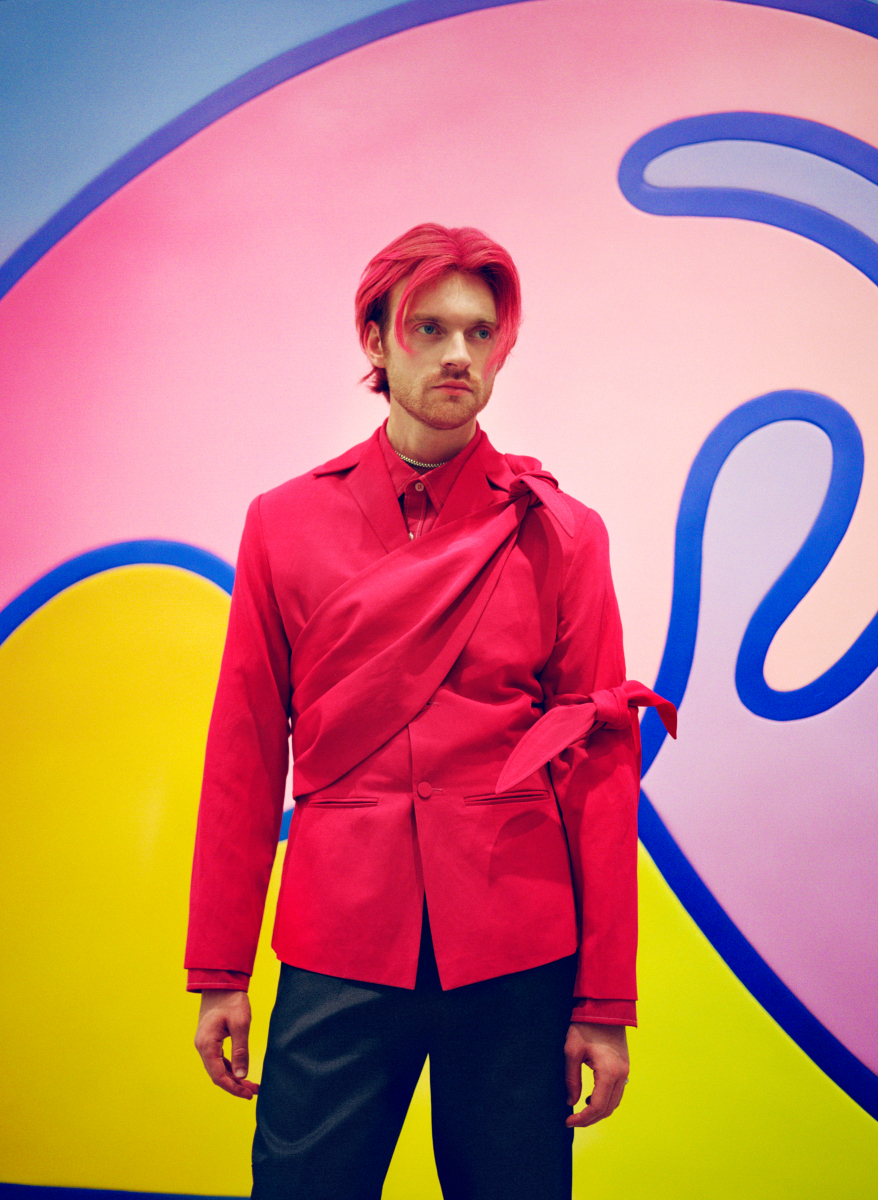
Israel: Yes. In high school I was still too green to know that I could work in a gallery, but when I was in college, I thought maybe that’s what I’d do, or that I could work at a museum or as an architect or an art history teacher or in some other capacity close to art. And then when I finally saw what being an artist could be, I realized that’s what I wanted to do. It was a scary thing to announce because I was pretty young and came from a family that wasn’t creative and artistic.
Finneas: I had the same feeling as I got a little older. I thought being an engineer in a studio that artists come in and out of would be probably fairly fulfilling or working at a label as assistant to an A&R. I wanted to be under the umbrella of music in whatever capacity.
Israel: It’s certainly hard to say, “Oh, I’m going to be a full-time creative.” It’s a declaration that you’re going to be putting yourself out there, constantly.
Finneas: Totally.
Israel: Such things can become paralyzing, so it’s a good thing you got over it and did it.
Finneas: The other thing is that I work really well with deadlines. I’ve been working on this one project for so long and it’s because there’s no deadline. If a deadline materializes for this project, I’ll get it done before that, but right now I’m working at this snail’s pace. When you are
creative, especially in the early stages, you have no deadlines: it’s on you to finish pieces, and it’s on you to put them together. A lot of people find that hard enough, to just be their own taskmaster.
Israel: Yes. Being my own taskmaster is something that’s always come naturally to me. It sounds like you are the same.
Finneas: Yes, I feel compelled to finish. I feel bad or tortured if I have something that I haven’t finished and should have. I can’t sit and watch a movie with my family if I’m like, “I should record those vocals.”
Israel: Going back to your origin as a young musician, was it always both singing and playing piano for you, or was one more dominant?
Finneas: I was in a choir program in LA called the Los Angeles Children’s Chorus. It’s super classical, it’s secular—maybe that’s the wrong word for it, but we sang music of all religious backgrounds, and it was all rehearsed and performed in a church. It was a great exposure to different types of classical music, and it was also rigorous, and so if organizations like the Hollywood Bowl or the LA Philharmonic needed children’s voices for a piece they’d call. That
was probably the coolest part of it. It was this very professional-feeling environment. My identity was for a long time that I was a singer. Funnily, that was not good training at all for singing in pop. They were holding kids to a very high standard of behavior, more so than ability. It was just like, “Listen, we’re backstage at the LA Philharmonic, everyone else here is like the best violinist of all time so don’t be a fucking brat and annoy them or shout at each other.” It was, “Don’t move. Sit there like a statue.”
We actually did Billie’s new album in its entirety at the Hollywood Bowl this summer, and we did a bunch of it with the LA Philharmonic. Gustavo [Dudamel, the orchestra’s director] is the coolest, chillest guy and I could barely talk to him. I was so intimidated from childhood of him and had that weird internal, “This is wrong. I’m not a high enough power level to communicate with this person.”
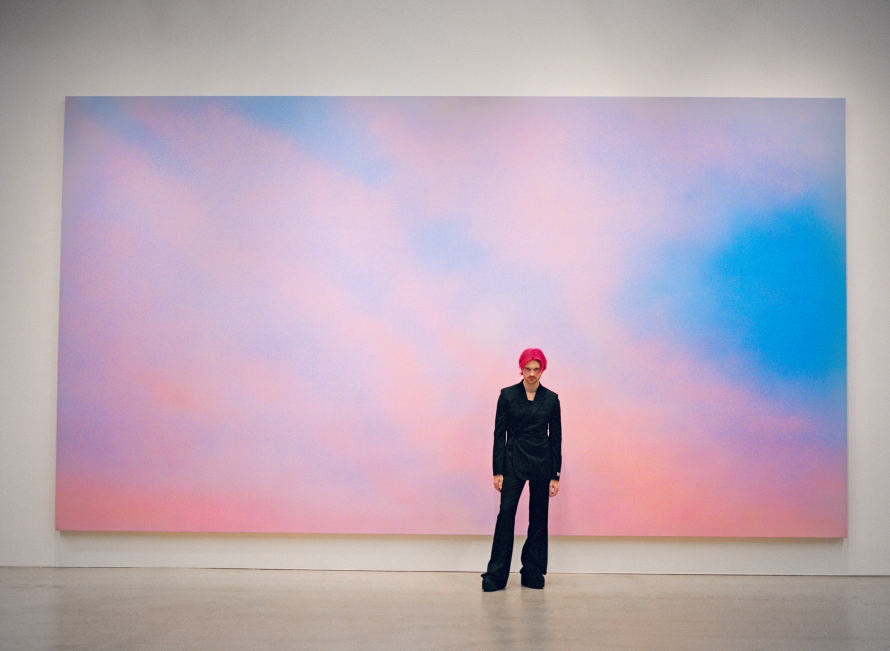
Israel: It’s like when you see an old teacher, and they want you to call them by their first name and you’re like, “I just can’t do that.”
Finneas: I can’t. I had another choir director who I loved, Anne Tomlinson, who was just really incredible at her job. She was rigorous and stern and all the stuff you want in a teacher. One time I remember she saw me sprinting down the hall. I did the Ferris Bueller. I was running down the hall and then stopped because I saw her. She just laughed and said, “You seemed so scared of me. You don’t have to be so scared of me.” I remember being like, “It’s probably good. It keeps me from making jokes in the back with my friend and laughing. That’s the alternative here. I’d rather be intimidated by you.”
Israel: Would you credit Los Angeles as having played a role in nurturing your interest and talent in music?
Finneas: Yes, for sure. The biggest credit goes to my folks.
Israel: I’m curious to hear how you went from playing piano and singing and writing music, to producing music?
Finneas: Recorded music has always been the thing that I was always just really enamored with, more so than live performance or live to tape. I’ve always listened to a lot on my headphones, so you hear all the cool panning of instruments and some crazy nuanced stuff that you wouldn’t hear if you were listening on a little boombox in your house. I was in this band in high school with my friends, and we were so bad.
Israel: What were you called?
Finneas: We were called Hollow Point Eyes for a while. What you can do if you’re in a band is split a day’s worth of studio time. You go in with an engineer, they set up mics on all of you and you track it live. You come away and when you’re just listening to it stone cold on a CD in your car, you’re like, “We all sound terrible.” So began my, “How do I make this not so terrible?” I’d pay for another day, and I’d go back and be like, “Can we redo the guitars?” They’d be like, “Sure,” and those would get a little bit tighter, and I was like, “Can we redo the drums? Can we
overdub some shakers? Can we overdub some background vocals?” You learn that a production that you’re hearing where you’re thinking about the piano and the vocal might have 40 layers of harmonies way in the background and a beautiful subsynthesizer underneath the whole thing. I became enamored with it. Then when I was 14, the price of Logic Pro X went down from $800 to $200. I found it accessible enough that I could be super bad at it but learn. I’ve always wanted to learn how to code, but it’s not intuitive enough for me to get any better at all. Something about Logic was like, “This is hard and I don’t sound good, but I am learning every time I’m doing it.”
Israel: It helped you narrow the gap between what you heard on the radio and what you heard on the CD that you took from the recording sessions.
Finneas: Exactly. I didn’t have to pay for studios. I could just do it myself. Most of my band’s drums we tracked in my sister’s bedroom. We set up a million mics and a full kit and pissed her off. It’s fun.
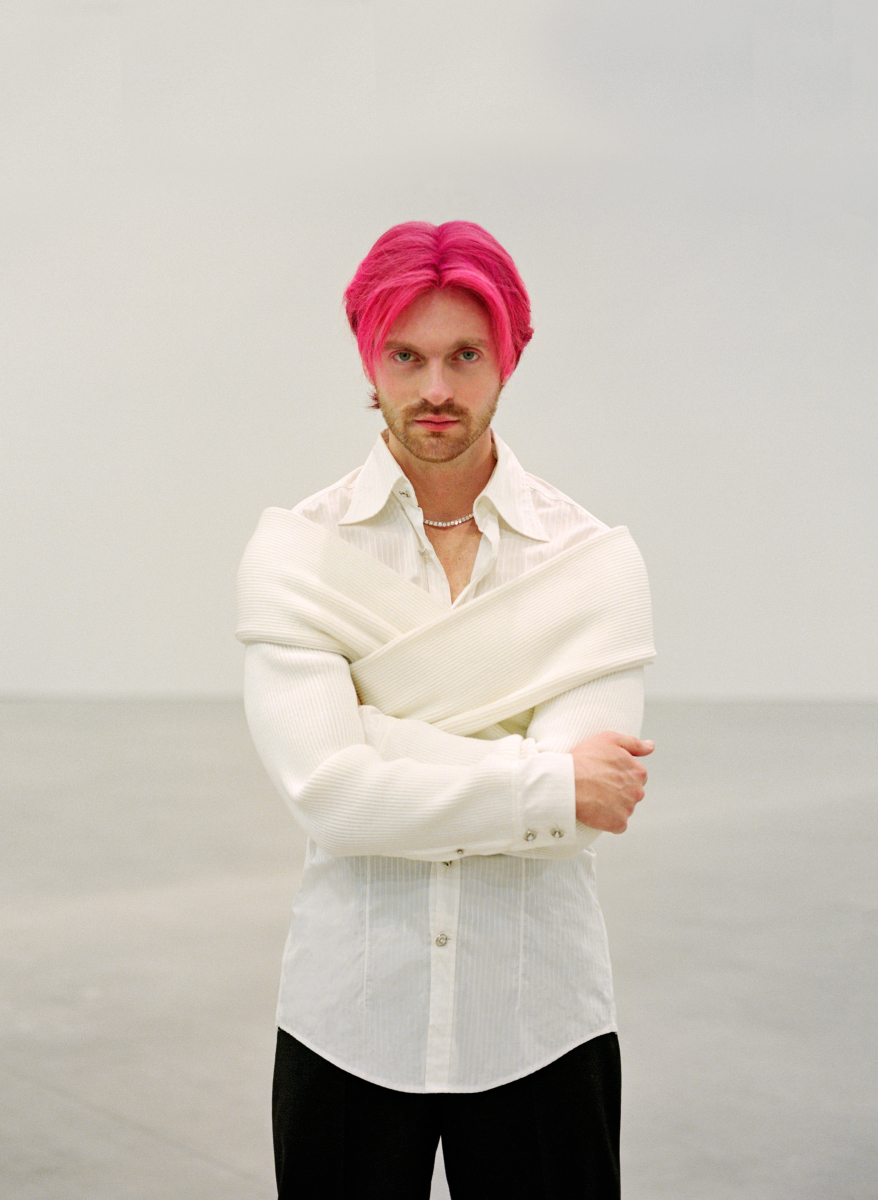
Israel: Is Billie your only sibling?
Finneas: It’s just the two of us. There was a period of time where I really wish there had been a
front-of-house engineer or a tour manager but it is just the two of us. We were and are close in and out of our professional sphere; we’re just very close. We love each other a lot. I’m actually about to go on a tour, really the first substantial full United States tour that I’ve done alone as a solo artist, but the number one thing I’m apprehensive about is I usually go everywhere with her and I get to travel with my confidant and best friend. I love our crew, but it’s not the same as your sister.
Israel: It’s an opportunity to grow.
Finneas: You’re right. The other thing about us doing all this together, even though it’s her name and it’s her visions, is I remember seeing the Beatles movie Eight Days a Week and there’s some interview clip where I think Paul or George talks about how the Beatles all knew Elvis. They’re like, “He’s the only Elvis and we always had each other on the highest of highs and at the lowest of lows.” It’s so nice to have your sister there to roll your eyes at and be like, “This is so lame today.”
Israel: That must be an incredible advantage.
Finneas: It’s really good. We both have a lot of these single-entity friends who have their entourage, but it’s really just them. It seems really trippy mentally. Who do you bounce ideas off of really? The amount of times Billie or I get asked to do something and one of the other ones goes, “I don’t think that’s a good idea.” I know that if it were just one of the two of us, we’d say yes to all of it.
Israel: That honest friend. The honest person there in the room with you all the time.
Finneas: Exactly. What does that look like in your professional career? As a musician, there are these auxiliary titles that people know about. There’s your engineer, and your mastering engineer, and then live there’s your band and stuff. What are the roles of the people that you turn to?
Israel: We have our art dealers, who are our outlets to the commercial world, we have curators who are our conduits to the museum world. Those are traditional roles. I have a studio assistant; I have fabricators who help me to create my art. There are all these different people in my ecosystem. I’ve also worked with collaborators. I worked with the writer Bret Easton Ellis and we made art together. That was a great experience. I work with brands. I do all kinds of things, and there are always other people involved. In my art practice, I don’t ever lock myself in a room and create.
Working with other people gives me a little bit of distance from what I’m doing, which is really helpful in terms of being able to be selfcritical and to think about what I’m doing with a bit of space. It’s kind of a system or structure I’ve set up to help myself be more self-aware. But then sometimes you have to lose yourself completely and just forget all of that—all the systems you’ve established and all the routines.
Finneas: Absolutely. Who do you have mutual complaints with? Who do you sit with and go like, “Oh, and then this happens,” and they sit with you and they go, “Ah, tell me about it.” Who’s that person for you?
Israel: It’s not one person but I do have peers, other artists. And any one of those people whom I mentioned before as being in my orbit could take on that role for me. It could also be friends. You’re lucky it’s your family for you.
Finneas: Yes, it’s my family and then the other people that I probably get to commiserate with the most frequently are other producers, writers, collaborators.
Israel: Your peers?
Finneas: Yes, it’s an odd relationship we all have with our collaborators where we’re supposed to inform the creative heavily and guide it and nurture it. At the end of the day, you’re still very much in the employ of this artist and so the power dynamic can get odd. The best collaborators, like the most generous ones, they’ll go, “Oh, what do you think about this?” And often times the label is saying, “Please guide this. They need you to guide them on this.”
They themselves are in the room going, “I don’t want to do that at all.” I always pick the side of the artist because I’m working with them because I admire or I’m inspired by them. You sometimes are succeeding in one room and simultaneously failing in the other room.
Israel: Always pick the side of the artist. Always.
Finneas: It’s never ever turned out to be the wrong choice.
Israel: It’s so necessary for the establishment of trust, which is so necessary for the freedom of creativity.
Finneas: If you make something, I mean, you see it happen a lot. There are so many artists, especially in the pop music space, putting out music that they are not passionate about and don’t like. Even if it does well on a commercial level, they don’t feel attached to it; they don’t feel proud of it.
The way that we operate is to make exactly what we want to make, and then if it’s popular, it’s popular by accident. I would advise everybody to work that way.
Israel: You can never predict what’s actually going to be popular, can you?
Finneas: Never. Once you are an established entity, you can cater to the kids that are already listening to your shows. We don’t necessarily cater to it, but we have them in mind. If we’re making some song, we have a lot of experience touring now and we’ll know, “Oh, this is going to be a really fun moment in the show and we’re all going to sing this line. This is going to be some call and response.” So, what are your most productive hours during the day?
Israel: Now that things have reopened, it varies. It’s rare that I feel I can truly be alone and focused on my thoughts. One is when I’m driving because I don’t look at text messages and emails and I’m able to just think, listen to music and be inspired. Another one is when I’m flying on an airplane. My favorite thing is to turn off my phone.
Finneas: I never buy Wi-Fi.
Israel: Me neither, never. There are certain times of day where things are quieter. Early in the morning if I’m jetlagged I can get a lot done before work starts, or at the end of the day when everyone stops calling. It’s about finding these quiet moments to be able to reflect and think, and to relax your brain a little bit. Then in that moment of relaxation often comes inspiration.
Finneas: When you talk about flights, are you working on the flights?
Israel: Sometimes I’ll actually pull out my laptop and write something or make notes about ideas that I have, but usually on flights I like to sleep and zone out and read a book and watch a movie. Yesterday I watched The Wizard of Oz on the way home from France, and I hadn’t seen it in decades and it’s an amazing movie. I’m not good at taking time for myself. I need to get better at that.
Okay, I’m just going to ask you a few speed-round questions. Have you watched Squid Game?
Finneas: I haven’t seen Squid Game yet and the only reason is that I’ve been in a silly, goofy mood as of late and I’ve been watching Ted Lasso and High Maintenance on HBO. The idea of watching a bunch of people be murdered, I’ll have to be ready for it.
Israel: What do you think of Adele’s new single [“Easy On Me”]?
Finneas: I like it. I have to admit to myself that I would have maybe overproduced it, and that’s just a testament to how incredibly minimalistic Greg Kurstin kept the vocals and the piano. The production is so simple and I love it. I think really it’s just because it’s Adele’s voice, and that’s all we want to hear. It’s beautiful.
Israel: What was it like working on No Time to Die?
Finneas: Stressful. It was really fun. There were a lot of moving parts and a lot of people. Usually, our metric of success is if we like something at the end of it, and that was not our metric of success there. Once we liked it, then it was like, “Let’s figure out if we can get all of these other people to like it too.” It was an honor and cool to work with Hans Zimmer, it was really fun.
Israel: What are your thoughts on Erewhon [the notorious Los Angeles health-food store]?
Finneas: They have an orange-glazed cauliflower at their hot bar that I love. Or is it rice?
Israel: It’s buffalo cauliflower.
Finneas: They have buffalo cauliflower, and then they have an orange rice ball. I’m so glad you remember. The buffalo cauliflower is what I was thinking of, but they also have an orange glaze on a ball of rice. Love that shit. I love watermelon. If you buy any quantity of watermelon there, it’s the best. It’s so good. It’s the best.
Israel: What’s the best thing about Gen Z?
Finneas: The thing that everybody says is the worst thing about Gen Z. They’re sensitive. Sensitivity is great, that’s going to lead to better people.

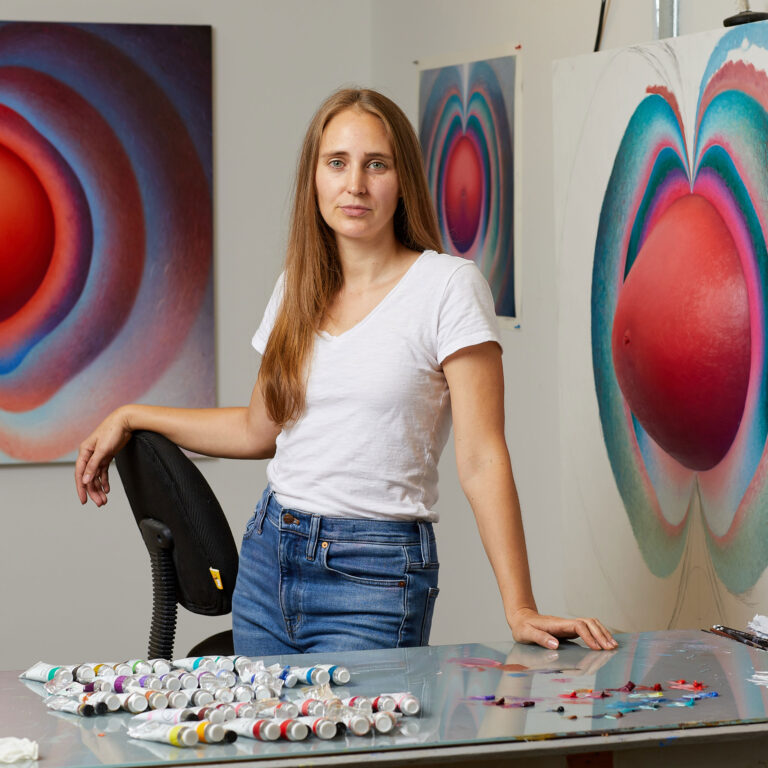


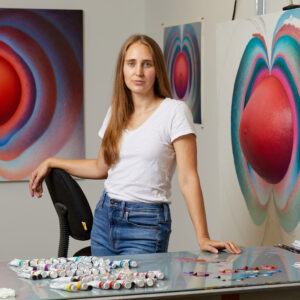





 in your life?
in your life?

